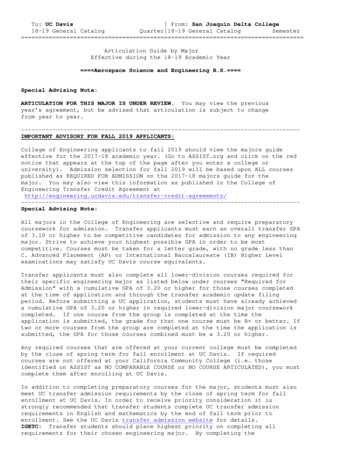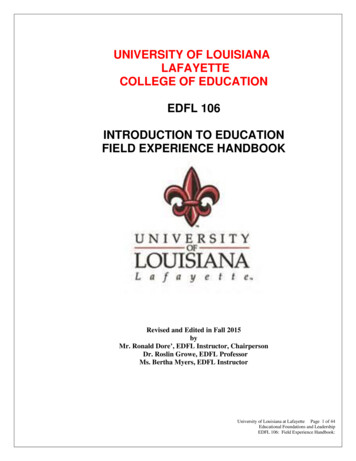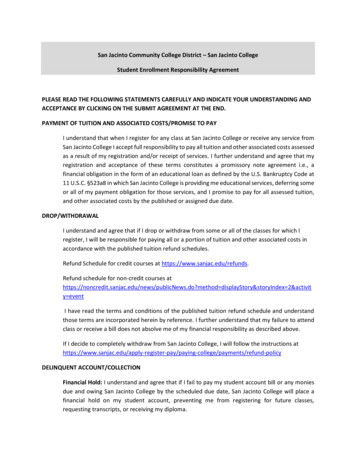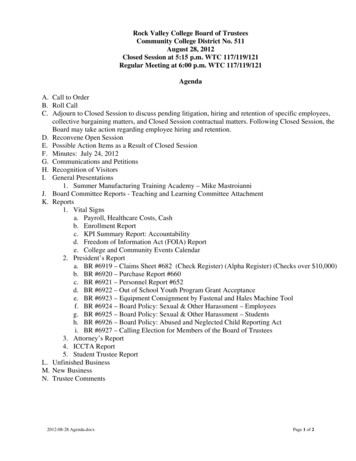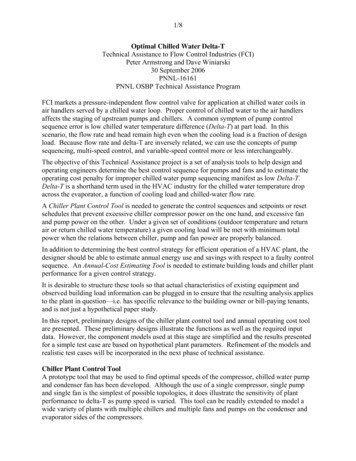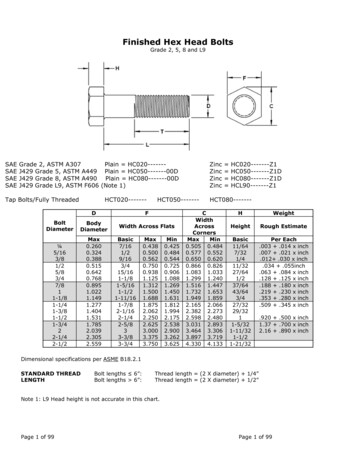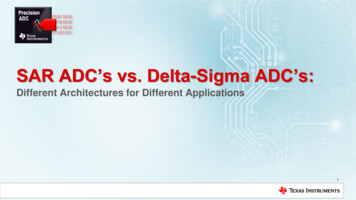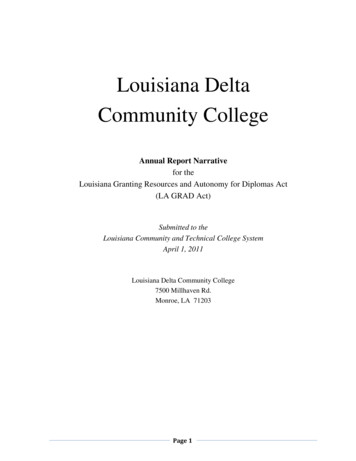
Transcription
Louisiana DeltaCommunity CollegeAnnual Report Narrativefor theLouisiana Granting Resources and Autonomy for Diplomas Act(LA GRAD Act)Submitted to theLouisiana Community and Technical College SystemApril 1, 2011Louisiana Delta Community College7500 Millhaven Rd.Monroe, LA 71203Page 1
Table of ContentsSTUDENT SUCCESS (1) . 51 A. Implement policies established by the institution’s management board to achievecohort graduation rate and graduation productivity goals that are consistent withinstitutional peers. . 51A i 1st to 2nd year retention rate. . 71A ii 1st to 3rd year retention rate . 81A iv Same institution graduation rate . 81A v Graduation Productivity – . 81A vi Award Productivity – . 101A vii Statewide Graduation Rate . 111A viiiPercent of freshmen admitted by exception . 111A ix Median Professional School Entrance Exam . 111B. Increase the percentage of program completers at all levels each year . 121C. Develop partnerships with high schools to prepare students for post-secondarywork. . 141C i Number of high school students enrolled. 161C ii Number of semester credit hours in which high school students enroll . 161C iii Number of semester credit hours completed by high school students . 161D. Increase passage rates on licensure and certification exams and workforcefoundational skill . 161D i Passage rates on licensure/certification exams – . 161D ii Number of students receiving certifications . 181D iii Number of students assessed and receiving WorkKeys certificates – . 181D iv Other assessments and outcome measures for workforce foundational skills to bedetermined. 18ARTICULATION AND TRANSFER (2) . 192A. Phase in increased admission standards and other necessary policies by the end ofthe 2012 Fiscal Year in order to increase student retention and graduation rates. . 192B. Provide feed-back to community colleges and technical college campuses on theperformance of associate degree recipients enrolled at the institution. . 242B ii Number of baccalaureate completers that began as a transfer student with anassociate degree – . 252C. Develop referral agreements with four-year universities to redirect students who failto qualify for admission into the university. . 26Page 2
2C i Number of students referred. 272C ii Number of students enrolled . 272D. Demonstrate collaboration in implementing articulation and transfer requirementsprovided in R.S. 17:3161 through 3169 . 282D i Number of students enrolled in a transfer degree program. 282D ii Number of students completing a transfer degree . 292D iv Number of baccalaureate completers that began as a transfer student with atransfer associate degree . 29WORKFORCE AND ECONOMIC DEVELOPMENT (3. 303A. Eliminate academic program offerings that have low student completion rates asidentified by the Board of Regents or are not aligned with current or strategic workforceneeds of the state, region, or both as identified by the Louisiana WorkforceCommission. . 303A i Number of programs eliminated . 303A ii Number of programs added or modified. 323A iii Percent of programs aligned with workforce and economic development needs 333B. Increase use of technology for distance learning to expand educational offerings . 333B i Number of course sections with 50% and 100% instruction through distanceeducation . 343B ii Number of students enrolled in courses with 50% and with 100% instructionthrough distance education . 353B iii Number of programs offered through 100% distance education . 353D. To the extent that information can be obtained, demonstrate progress in increasingthe number of students placed in jobs and in increasing the performance of associatedegree recipients who transfer to institutions that offer academic undergraduate degreesat the baccalaureate level or higher . 353D i Percent of completers found employed. 373D ii Increasing the performance of associate degree recipients who transfer. 37INSTITUTIONAL EFFICIENCY AND ACCOUNTABILITY . 384C. Upon entering the initial performance agreement, adhere to a schedule established bythe institution's management board to increase nonresident tuition amounts that are not lessthan the average tuition amount charged to Louisiana residents attending peer institutionsin other Southern Regional Education Board states and monitor the impact of suchincreases on the institution. However, for each public historically black college oruniversity, the nonresident tuition amounts shall not be less than the average tuitionamount charged to Louisiana residents attending public historically black colleges anduniversities in other Southern Regional Education Board states. . 384C i Total tuition and fees charged to non-resident students . 38Page 3
4D. Designate centers of excellence as defined by the Board of Regents which havereceived a favorable academic assessment from the Board of Regents and havedemonstrated substantial progress toward meeting the following goals . 404D i Offering a specialized program that involves partnerships between the institutionand business and industry, national laboratories, research centers, and other institutions. 414D ii Aligning with current and strategic statewide and regional workforce needs asidentified by the Louisiana Workforce Commission and Louisiana EconomicDevelopment . 415. Submit a report to the Board of Regents, the legislative auditor, and the legislaturecontaining certain organizational data, including but not limited to the following: . 42Appendix 2C 1 . 45Page 4
Louisiana Delta Community CollegeGrad Act Performance Objectives/Elements/MeasuresSTUDENT SUCCESS (1)1 A. Implement policies established by the institution’s management boardto achieve cohort graduation rate and graduation productivity goals thatare consistent with institutional peers.Response:Policy/policies adopted by the management board.Louisiana Delta Community College is deeply committed to student success as a core collegevalue. Delta has participated fully in the development of LCTCS policies targeting studentsuccess, and has developed institutional policies which complement those developed at thesystem level.LCTCS has developed several academic policies specifically designed to increase graduationrates. These policies address general admission requirements, probation, suspension,amnesty, cross-enrollment, repeat/delete courses, programmatic accreditation, and nontraditional credit, to name a few. These policies were approved as stated below:1. 1.002 Delegation of authority to Chancellors to Sign and Distribute Degrees,Diplomas. May 10, 2000.2. 1.006 Academic Amnesty. October 10, 2002.3. 1.010 Program Assessment. March 14, 2001.4. 1.014 Assessment. November 14, 2001.5. 1.016 LCTCS Cross-Enrollment Policy. November 14, 2001.6. 1.020 Academic Status. Fall, 2003.7. 1.023 LCTCS Policy on Non-Traditional Credit. December 12, 20018. 1.025 Articulation. May 11, 2011.9. 1.028 Academic Renewal. February 14, 2002.10. 1.029 Disclosure of Degree Program Transferability. August 14, 2002.11. 1.036 Cross-Enrollment Agreement between System Institutions, July 9, 2003.12. 5.025 Tuition Discounts and Waivers. August 10, 2005.Page 5
Timeline: Many of the policies listed above have already been implemented. Additionalpolicies under review will be implemented by spring semester 2012.Subsequent Delta PoliciesDelta’s Student Handbook (2008 – 2010) lists current policies which complement theLCTCS policies and promote student retention, persistence, and graduation. The currentStudent Handbook is being updated for printing in the 2011-2013 academic years.1. 4.01:01 The right to participate in academic, co-curricular and extracurricularactivities and benefit functions of the College.2. 4.01:04 The right to a formal appeals procedure by which reconsideration of anaction by the College through one of its employees, which adverselyaffects a student may be requested.3. 4.02 Responsibilities of Students4. Satisfactory Academic Progress Policy (Delta Student Handbook)5. Mandatory referral to Student Success Center for at-risk students (Spring 2012)6. Early intervention procedure for excessive absence/poor early course performance(Spring 2012)Timeline: Subsequent Delta policies addressing retention, persistence, and graduation havealready been implemented or in the process of being implemented. Additional strategicdiscussions regarding developmental coursework, mandatory referral to Student SuccessCenter, and early intervention strategies for at risk students are under consideration and willbe developed during the fall 2011 semester.Delta’s current College Catalog includes Policies and Procedures addressing the followingareas which also parallel the LCTCS policies listed above and address the challenges ourstudents face in completing programs and degrees. These include: Academic Load,Attendance, Grading, Probation/Suspension, Incomplete grades, Scholastic Honors, Degree,Certificate, and Program Requirements, General Education Outcomes Assessment,Graduation Requirements, Course Descriptions, Hardship Waivers of Tuition and Fees, andmany others designed to promote student success. The Policies can be obtained in hardcopyor online at alog1011.pdf .Delta’s new facility is state of the art and addresses student technology needs in laboratoriesand classrooms. All classrooms in the 135,000 square foot facility are equipped withsympodiums (interactive screens for writing electronic notes and for recording audioPage 6
synchronized data files) and projectors. Both buildings are equipped with wi-fi andCompressed Video capability throughout. The Advanced Technology Center is equippedwith over 750,000 of state of the art, hands-on industrial equipment focusing on ProcessTechnology and Advanced Manufacturing.Developmental Coursework RevisionsTo enhance student success and improve graduation rates, Delta has instituted changes toDevelopmental Reading, English and Mathematics. Beginning in the fall 2011 semester, apilot program will be implemented whereby developmental math students required to takeboth Math 095 and 099 will be able to complete both courses by enrolling in a totalimmersion mathematics course. The class meets four days a week, two hours per day, taughtby the same instructor. Our studies show that students who take developmental math inshortened summer sessions passed at a higher rate than students in a regular semester coursedue to the intensified exposure in the total immersion experience. A similar “best practice” isemployed by the U.S. State Department and Military to successfully teach foreign languagein a short period of time.1A i 1st to 2nd year retention rate.Attachment D 4‐year university, 2‐year college, technical college ‐ Year 1 Annual ReportLouisiana Community and Technical College SystemInstitution: Louisiana Delta Community CollegeDate:GRAD Act Template for Reporting Annual Benchmarks and 6‐Year TargetsElement Reference MeasureBaseline Year/TermData to includeBaselineYear 1data BenchmarkYear 1 *ActualYear 2Year 3Year 4Year 5Benchmark Benchmark Benchmark BenchmarkYear 6Target1. Student Successa. i.Targetedii. Targeted1st to 2nd Year Retention Rate ( /‐)**Fall 08 to Fall 09Actual Baseline Data: # in Fall 08 Cohort# retained to Fall 091st to 3rd Year Retention Rate ( /‐)**Fall 07 cohortActual Baseline Data: # in Fall 07 Cohort# retained to Fall 09iii. TargetedFall to Spring Retention Rate ( /‐)**Fall 08 to Spring 09Tech Coll OnlyActual Baseline Data: # in Fall 08 Cohort# retained to �Yr onlyiv. Targetedv.Targetedoptionalvi. Targetedoptionalvii. TargetedSame Institution Graduation Rate ( /‐)**2008 Grad Rate SurveyActual Baseline Data: Fall revised cohort (total)completers 150% of timeGraduation Productivity ( /‐)**2008‐09 AYActual Baseline Data: 2008‐09 undergrad FTEcompleters (undergrad)Award Productivity ( /‐)**2008‐09 AYActual Baseline Data: 2008‐09 undergrad FTEawards (duplicated)Fall 2002 CohortStatewide Graduation Rate ( /‐)**na9.4%8580nananaoptionalb. i.Actual Baseline Data: # of Fall 02 FTF (cohort)completers 150% of timeTargeted *** Percent Change in program completers ( /‐)**Certificate ‐ 1 yr (Award level 1)2008‐09 ssociate (Award level 2)2008‐09 AYPage 7
Response:Delta had traditionally reported high retention rates, averaging 60.4% for the previous fiveyears, achieving the highest retention in the system in 2006 – 2007 (66.5%). After SACSaccreditation Delta became eligible for Pell Awards in the fall of 2009. Knowing that largernumbers of academically challenged students would be enrolling, Delta projected a lowerretention rate for its GRAD Act baseline. Unfortunately the adjustment was not enough tocompensate for the influx of at-risk students. Given the history of success rates of Pell GrantRecipients, Delta has already begun discussion on ways to help these students succeed.As a result of the increased numbers of students requiring additional support, Delta has put inplace programs and services to address these students’ needs in order to increase theirretention rate. These include a comprehensive orientation session for first-time, full timestudents, a student success course, and access to peer and faculty tutoring in the college’snew Student Success Center. Delta continues to provide course advising from full-timefaculty for all students.1A ii 1st to 3rd year retention rate – NA1A iv Same institution graduation rate – Delta’s same institution graduation rate was12.9% .1A v Graduation Productivity –Completers in 2008 - 2009CertificatesAssociateCompleters 2009 - 2010CertificatesAssociateCompleters 2010-2011DiplomaCertificatesAssociatesPage 82922993823125
Page 9
1A vi Award Productivity –Completers in 2008 - 2009CertificatesAssociateCompleters 2009 – 2010CertificatesAssociateCompleters 5Response:Few certificates were awarded in 2008 – 2009 and 2009 – 2010 because students were noteligible for Pell Awards if they enrolled in certificate programs. Following the consolidationwith Tallulah/Lake Providence LTCs, Delta made a request to the Department of Educationto allow Pell Grant Awards to certificate seekers pursing certificates requiring 30 or morehours of college credit. For that reason we anticipate awarding more certificates in the future.Delta also instituted a policy change, effective January 2011, to actively check the progressof Associate Degree students who may have met the qualifications for a Certificate ofGeneral Studies enroute to receiving the Associate Degree. The chart above shows that Deltaawarded 23 certificates this year because of the policy changes.In addition to producing academic completers the Workforce Development Program at Deltaprovides training for industry needs. The table below shows the workforce trainingcompleters for 2010-2011.2010 – 2011 Workforce Training CompletersTraining ProvidedAttemptedCompletersAsbestos Abatement44Asbestos Worker Refresher44Certified Manufacturing Specialist237166Power Safe Testing7171OSHA 102121Page10Pass Rate100%100%70%100%100%
Forklift SafetyAdvanced HydraulicsAdvanced PneumaticsSpecialized Excel AccessPost Emergency Oil Spill Cleanup107812353107812352100%100%100%100%99.7%1A vii Statewide Graduation Rate – 13.33%( 4.pdf)Fall 2002 CohortCohort SizeNAGraduates4Fall 2003 CohortCohort SizeNAGraduates61A viii Percent of freshmen admitted by exception – NA1A ix Median Professional School Entrance Exam – NAResponse:Delta began its inaugural semester in fall 2001 with 232 students. Enrollment increased to280 in fall 2002 and 568 in fall 2003. Delta did not have a computerized record keepingsystem; and therefore cannot identify a first-time, full-time cohort.Delta admits no students by exception since we are an open admissions institution. We alsohave no professional school for which entrance exams are required.The LCTCS has adopted policy statements regarding achieving graduation rates andproductivity goals that are consistent with institution peers. Additionally the LCTCS Boardadopted a proposal developed by Chief Academic and Student Affairs within the system thatrecommends revising operational definitions and measures that would increase graduationrates that would better reflect the mission of Technical and Community Colleges.Page11
With the consolidation with LTC Tallulah/Lake Providence, Delta has been reviewingpolicies
Delta’s current College Catalog includes Policies and Procedures addressing the following areas which also parallel the LCTCS policies listed above and address the challenges our students face in completing programs and degrees. These include: Academic Load, Attendance, Grading, Probation/

